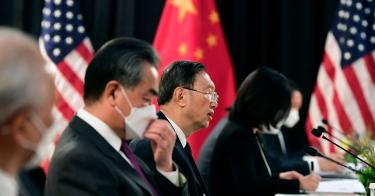In a tense exchange with their American counterparts during a recent meeting in Alaska, senior Chinese officials deployed a familiar argument: The United States has no right to criticize the crimes of the Chinese Communist Party-led regime because of the U.S.’s own racial and political problems.
It was all very predictable. In addition to signaling to the Chinese people that the CCP will not brook criticism from foreign powers, the officials were trying to undermine America’s moral standing. That criticism is part of Beijing’s long campaign to upend the U.S.-led global order.
The stakes in this contest are extraordinary, yet even some American commentators appear unable to distinguish between the United States and a human rights disaster like the Chinese Communist Party. Such obtuseness makes it even harder to defend the order that has delivered unprecedented global peace and prosperity.
One of the CCP’s most cherished goals is returning China to what it sees as its rightful role as a global power. The party views the United States as the primary obstacle to achieving that dream, and Beijing regards the U.S.-led international system, including its human rights norms, as part of the conspiracy to subvert its rule. It is heavily investing in “telling China’s story well” and has unleashed its diplomats to harangue, lie about, and spread conspiracy theories to discredit the United States and others that support the current international system.
>>> China Transparency Project
Meanwhile, the United States’ heated social and political environment of the last several years has provoked some truly confounding claims in American publications.
A New York Times op-ed by Isabel Wilkerson, riffing off her widely feted book on the same topic, compared the U.S. to Nazi Germany, the regime that killed around 17 million people as it tried to eradicate Jews and others it considered undesirable. (The book also managed to downplay the horror of India’s caste system.) A different piece compared the United States to South Africa’s apartheid system of racial oppression that restricted the majority black population to about 10 percent of South African land, barred non-whites from voting in national elections, and forcibly displaced people for being in the wrong racially designated area, among many other crimes.
Yet another writer discerns parallels between U.S. protests sparked by George Floyd’s killing and the Arab Spring uprising in Egypt—led at the time by a dictator who had reigned for three decades—and argued that Washington can no longer credibly speak about others’ human rights abuses. That presumably excludes talking about: the gulags in North Korea and China; Mauritania, where as much as 20% of the population may be enslaved; Syria, which gasses its own people and tortures thousands to death, and Ethiopia, where ethnic cleansing is ongoing.
There are objective measures that demonstrate just how inapt these takes are. The United States ranks 15th on the Quality of Life Index, 17th on the Human Freedom Index, 20th on the Index of Economic Freedom, 21st on the Rule of Law Index, 23rd on the Bribery Risk Matrix, and 25th on the Democracy Index. There is also the eyeball test. Minorities have held virtually every position of political power in the United States. A minority group is the highest-earning and longest-living of all groups. Millions of people, including many who would be minorities in the United States, line up at American consulates to try to get a visa, or embark on dangerous trips to try to enter the United States.
In addition to being analytical failures, comparisons between the United States and the world’s worst rights abusers are reckless. China is trying to convince the world that the values for which the United States is the global standard bearer fail to deliver superior human rights and other outcomes from despotisms like its own. They understand that stripping America of its moral authority makes it easier for them to defend their own far worse records and, especially in the case of China, to achieve their geopolitical goals.
>>> Ideas Matter: The Fight Against the Ideology of the Chinese Regime
None of this suggests that anyone should be satisfied with the United States’ place in the rankings cited earlier, or with the recent tumults that have wracked the country. The United States, despite the undeniable progress it has made, must always be vigilant to ensure for its people the freedoms its founding documents promise. That should be possible without drawing spurious moral equivalencies with Nazi Germany, apartheid South Africa, and China itself, which is arguably the most able competitor Washington has ever faced.
One of the great strengths of the United States, and a bellwether for all the freedoms it offers, is the ability for its people to have open, oftentimes bruising, debates. That should never be imperiled.
In this era of increasingly sharp great-power competition, as Beijing seeks to restructure a beneficial world order and shield its own appalling record from criticism, it is also critical that analysts reject the temptation to offer overheated, factually dubious claims during these debates. People might actually believe them.
This piece originally appeared in RealClear World



